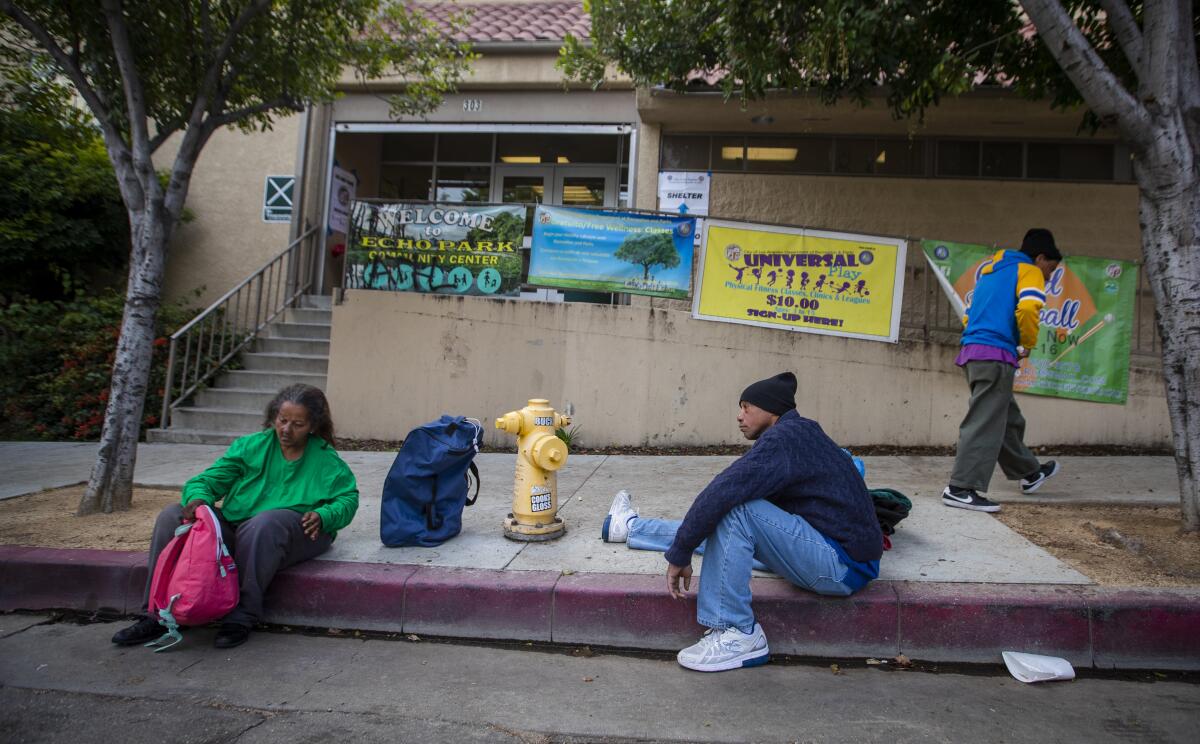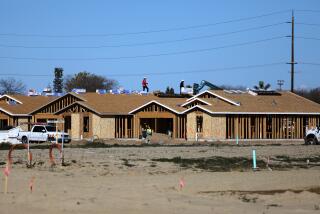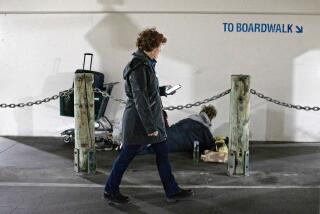Coronavirus will make California’s affordable housing problems worse, experts say

- Share via
California already faced a shortage of more than 1 million homes for low-income families before the novel coronavirus hit. And now many advocates, economists and politicians say the pandemic is only going to make the situation worse.
Major job losses, particularly in low-wage restaurant and hospitality sectors, and what will probably be severely depressed tax revenues for California and its cities, could create an even greater need for affordable housing at a time when government has less money available to help finance it.
“There’s all these households that are one paycheck away from not being able to pay their rent,” said Carolina Reid, faculty research advisor at UC Berkeley’s Terner Center for Housing Innovation. “Well, now that paycheck is gone. And there’s no prospect for when that paycheck is coming back.”
On Thursday, Gov. Gavin Newsom ordered all 40 million Californians to stay at home — with limited exemptions for crucial businesses, such as grocery stores — to slow the spread of the coronavirus. While many people are now working from home, that option isn’t available to restaurant and hospitality workers, who have lost jobs and seen their hours cut as food service is limited to grocery stores, and takeout and delivery services.
Millions of residents were already facing severe cost burdens because of rent that has outpaced income growth at a time when overall housing production has remained low.
From 2000 to 2018, the median annual cost to rent an apartment or home in California increased 40% while incomes have gone up only 8% after adjusting for inflation, according to a new analysis of U.S. census data by the California Housing Partnership Corp., an advocacy organization. These trends have contributed to a shortage of 1.3 million homes for low-income families, the analysis found.
Nevertheless, Matt Schwartz, the organization’s president and CEO, said there have been some encouraging signs.
Compared with prior years, the shortage of low-income homes had stabilized and the construction of new homes had increased, the analysis showed. Moreover, spending on housing development is increasing, chiefly through the $6 billion in state funding that voters approved in 2018.
But now Schwartz worries that the economic effects of the pandemic will ruin that progress.
“It may swamp all of the state and local voters’ best efforts to ramp up production — unless there’s a really big federal and state response now,” he said.
So far, state and local government officials have focused on immediate assistance to renters and homeowners, with Newsom encouraging California cities, including Los Angeles, to pass temporary bans on evictions and foreclosures as a result of the virus. The Los Angeles City Council also is considering tapping city funds to help affected renters.
A focus on keeping people in their homes right now might help reduce the number of families who’ll need new housing after the pandemic. But it also could sap tax revenue that government agencies might have otherwise used to support construction.
Additionally, if the economy continues its downward trajectory in the wake of the pandemic, it will decrease the money government has available to help Californians who are housing insecure.
Assemblyman David Chiu (D-San Francisco) said that he’s hearing constantly about the urgent need for state funding. Lawmakers, Chiu said, have to prioritize these immediate requests when they return to their session next month after recessing amid fears of spreading the virus.
“Our challenge as the Legislature when we reconvene is, how do we triage incredibly scarce public dollars,” said Chiu, who is chairman of the Assembly Housing and Community Development Committee.
Before the virus hit, Chiu said, lawmakers had already started prioritizing funding requests for homeless housing and services over the development of new low-income housing. Now, with budget pressures much greater, Chiu said the state needs to find ways of funding affordable housing that is less dependent on existing tax revenue, such as his pending legislation that would reduce homeowners’ ability to deduct mortgage interest payments from their state taxes.
A recession, Chiu said, might make it less costly to build low-income housing through lower land and construction prices, and he believed the state should act accordingly.
“Historically, what always happens is you have a housing boom and a housing bust,” he said. “Low-income housing development has always tracked with those cycles. This time, if we’re smart, we have to think about how to build affordable housing counter-cyclically.”
Some economists, however, say that the virus won’t worsen the already intense demand for housing in California.
Christopher Thornberg, founding partner of L.A.-based Beacon Economics, said a reasonable federal economic stimulus plan and public health measures should prevent the coronavirus from having lasting effects on the economy. He considered the job losses to be more like furloughs that should end after stay-at-home orders expire.
“Housing is a long-run phenomenon,” he said. “This is inherently a short-run phenomenon.”
Still, Thornberg said, without fundamental changes aimed at increasing building in the state, shortages of available housing will remain no matter what happens.
“On the back end of the virus,” he said, “it’s going to be the same damn world.”
More to Read
Sign up for Essential California
The most important California stories and recommendations in your inbox every morning.
You may occasionally receive promotional content from the Los Angeles Times.







